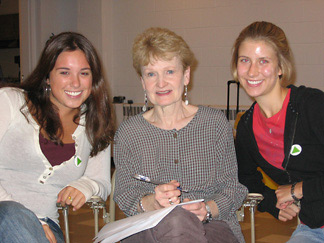Leaders are made, not born, as they learn to build teams, trust others and take risks
By Roger Segelken

Ruben Frescas '06, son of a stonemason and a warehouse worker from a small town in Illinois, had excelled in high school and was serving on Cornell's Emergency Medical Service as an EMT and a crew chief. But he longed to roll up his sleeves and really do something that would make a difference.
So he enrolled in a course called Collaborative Leadership that is part of the multiyear Leadership Initiative program in the College of Human Ecology. The course starts with a required retreat -- 48 intensive hours of self-discovery and full immersion among a diverse spectrum of personality types, all would-be team-builders, and everyone competing (and, ideally, collaborating) to lead toward achievement.
"The class helped me build confidence and gave me skills," he recalls. "I never thought I could do half the things I've done at Cornell." One of those things was developing a new mentoring program for premed juniors to help them through the bewildering process of selecting appropriate courses and preparing for the dreaded Medical College Admission Test.
Brenda Bricker, who started the Leadership Initiative program six years ago, is the director of leadership and undergraduate research for the college. Bricker worked in admissions for 25 years, reading many thousands of application essays. She realized that while many Cornell applicants probably are potential leaders with confidence aplenty, once they arrive at Cornell and hunker down, somewhere along the line their dreams are deferred.
"We tell them not to wait for some magic moment, later in their career, to change, to take on the mantle of leadership," Bricker says. "We tell them, 'There are important things to be done now, things that you can do better than anyone else. What are you waiting for?'"
The program teaches that we are all born with the potential to lead, but that most leadership traits require effort and experience to develop, that all kinds of leaders can contribute, that charisma alone is rarely sufficient.
"We demonstrate that there are many styles of leadership," Bricker says. "We help them discover that whether they're shy or inexperienced, that does not have to be a limit, that it is important to embrace both your strengths and liabilities."
Students learn early in the leadership training that without diversity on a team, progress is difficult and incomplete and that students need to get over that habit of doing all the work themselves. Real leaders, the course teaches, seek help from others and don't try to run away with the project.
Leadership Initiative participants work toward the Leadership Certificate -- the honors-level credential that they are experienced problem-solvers who can collaborate to meet ambitious goals. One of its requirements is a project relating to their major that students propose, design and carry out over two semesters by applying theory to practice in the community. The projects must ultimately be self-sustaining.
For Frescas, it was the premed mentoring program; for Rachel Barry '08, a design and environmental analysis major, it was further developing a project called Fostering Leadership in Youth together with premed student Paulvalery Roulette '08. The project trains Cornell students to lead after-school activities at an Ithaca middle school.
Another requirement for the Leadership Certificate is a year's volunteer service on the policy board of a nonprofit organization. The experience, Bricker says, is designed to acquaint students with community and professional leaders as models and to demonstrate the complexity of public service and its priority in the lives of many business and community leaders.
Bricker explores with the students the nature of their life-course decisions. She asks them, "What is the one thing you would do if you had only a year to do it?" One Leadership Initiative participant who pondered that question decided to go to medical school instead of law school -- more than a one-year commitment, of course, but that's what leaders do when they see all the possibilities in the big picture.
Teaching what can't be taught
The experiences students have as part of their leadership training are empowering and energizing for many students. But another "E" word Bricker focuses on is ethics, though Bricker believes ethics cannot be imposed by a college professor. Instead, the Leadership Initiative takes the model-and-challenge approach. Models can be people or the codes of ethics established for the professions students hope to join (law, medicine, business, for example), and students are helped to examine the ethical foundations of their own lives so far. For some, religious training was largely influential, Bricker notes, and some picked up their ethics from parents and peers. Preliminary perceptions are not always reality; Bricker says she hopes students will learn for themselves by careful observation.
"It is easier to cheat if you believe that everyone else is cheating. But are they really?" And even if others cheat, Bricker counsels, "You need to figure out what you stand for, then develop techniques for holding that course."
Roger Segelken is a senior writer with Cornell's Publications and Marketing; this article is adapted from Human Ecology magazine.
Media Contact
Get Cornell news delivered right to your inbox.
Subscribe